英语论文浅析古希腊文明
英文作文希腊文化
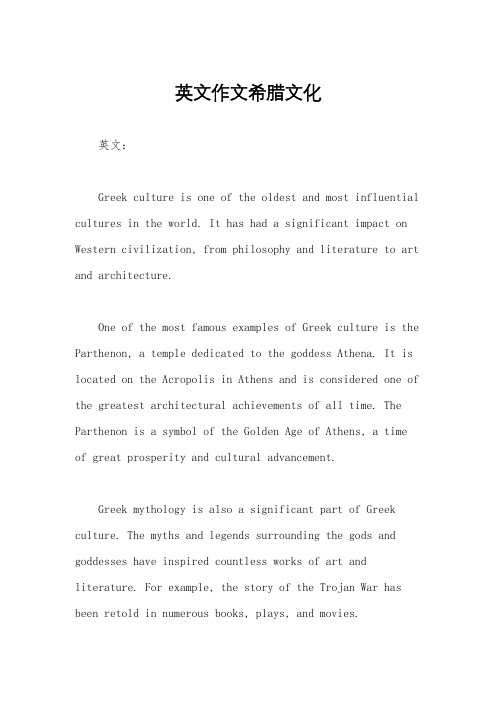
英文作文希腊文化英文:Greek culture is one of the oldest and most influential cultures in the world. It has had a significant impact on Western civilization, from philosophy and literature to art and architecture.One of the most famous examples of Greek culture is the Parthenon, a temple dedicated to the goddess Athena. It is located on the Acropolis in Athens and is considered one of the greatest architectural achievements of all time. The Parthenon is a symbol of the Golden Age of Athens, a time of great prosperity and cultural advancement.Greek mythology is also a significant part of Greek culture. The myths and legends surrounding the gods and goddesses have inspired countless works of art and literature. For example, the story of the Trojan War has been retold in numerous books, plays, and movies.Another important aspect of Greek culture is philosophy. The ancient Greeks were some of the first people to ask questions about the nature of reality and the meaning of life. Famous philosophers such as Socrates, Plato, and Aristotle have had a profound impact on Western thought.中文:希腊文化是世界上最古老、最有影响力的文化之一。
希腊文明英文作文

希腊文明英文作文Ancient Greece: The Cradle of Western Civilization。
Greece, a land steeped in legend and the birthplace of Western civilization, has left an enduring legacy that continues to shape the world today. From its towering temples and marble sculptures to its philosophical thought and literary masterpieces, Greece has made unparalleled contributions to human history and culture.Origins and the Bronze Age:The origins of Greek civilization can be traced to the Neolithic period, around 6000 BC. The Bronze Age, which began around 3000 BC, marked a significant turning point, as Greeks developed advanced metalworking techniques and established prosperous trading networks throughout the Mediterranean region.The Minoan and Mycenaean Civilizations:Two major civilizations flourished in Greece during the Bronze Age: The Minoans on the island of Crete and the Mycenaeans on the mainland. The Minoans were renowned for their advanced maritime skills, elaborate palaces, and exquisite pottery. The Mycenaeans, meanwhile, developed a powerful warrior culture and controlled much of mainland Greece.The Dark Ages and the Rise of City-States:The Bronze Age collapse around 1200 BC ushered in a period known as the Dark Ages, during which Greece experienced political and social upheaval. However, fromthe 8th century BC onwards, Greek city-states, known as poleis, began to emerge. These independent city-states were often fierce rivals, yet they also shared a common language, culture, and religious practices.The Classical Period:The classical period, from the 5th to the 4th centuriesBC, was the golden age of Greek civilization. Athens, the leading city-state, became a center of philosophy, literature, and the arts. Philosophers such as Socrates, Plato, and Aristotle laid the foundations of Western thought. Playwrights like Aeschylus, Sophocles, and Euripides created monumental tragedies and comedies. Sculptors like Phidias and Praxiteles crafted awe-inspiring statues.The Hellenistic Period:The death of Alexander the Great in 323 BC marked the beginning of the Hellenistic period. Greek culture spread throughout the Mediterranean region, and new cities such as Alexandria in Egypt and Antioch in Syria emerged as centers of learning and culture. Science, mathematics, and astronomy flourished in this period, with scholars such as Euclid, Archimedes, and Hipparchus making significant advancements.The Roman Conquest and the Byzantine Empire:Greece was conquered by Rome in 146 BC, becoming a province of the Roman Empire. However, Greek culture continued to influence Roman civilization, particularly in the areas of philosophy, literature, and the arts. Afterthe division of the Roman Empire in 395 AD, Greece became part of the Byzantine Empire, a Christianized successor state.Legacy and Influence:The legacy of ancient Greece is immense. Its democratic ideals, philosophical thought, and artistic masterpieces continue to shape modern societies. The Greek language became the lingua franca of the Eastern Mediterranean andthe basis for many modern languages. Greek mythology, literature, and philosophy have inspired and influenced countless artists, writers, and thinkers throughout history.中文回答:古希腊,西方文明的摇篮。
古希腊文化历史英语作文

古希腊文化历史英语作文Title: The Flourishing Legacy of Ancient Greek Culture。
The ancient Greek civilization is widely regarded asone of the most influential in human history, leavingbehind a rich tapestry of culture, philosophy, art, and governance that continues to shape our world today. Fromthe development of democracy to the enduring legacy ofGreek mythology, the contributions of ancient Greece are manifold and profound.One of the most enduring legacies of ancient Greek culture is its impact on the development of democracy. The concept of democracy, derived from the Greek words "demos" (people) and "kratos" (rule), emerged in the city-state of Athens during the 5th century BCE. Athenian democracy,while limited in scope compared to modern democracies, represented a significant step forward in governance by allowing citizens to participate in decision-making processes. This idea of rule by the people has since becomea cornerstone of modern political systems around the world.Another key aspect of ancient Greek culture is its literature and philosophy. Greek literature, particularly the works of Homer, such as the "Iliad" and the "Odyssey," laid the foundation for Western literary tradition. These epic poems not only entertained ancient audiences but also explored fundamental themes of human existence, such as honor, heroism, and the struggle against fate.Greek philosophy, epitomized by figures like Socrates, Plato, and Aristotle, revolutionized the way humans think about the world and their place within it. Socrates' emphasis on critical thinking and questioning established the foundation of Western philosophy, while Plato's metaphysical ideas about the nature of reality and theideal forms continue to influence thinkers to this day. Aristotle's contributions to logic, ethics, and politics remain foundational texts in academic discourse.Art and architecture are also integral components of ancient Greek culture. The Greeks pioneered architecturalstyles such as the Doric, Ionic, and Corinthian orders, which are still evident in buildings around the world, from government buildings to universities to museums. The Parthenon, a temple dedicated to the goddess Athena, stands as a testament to the ingenuity and aesthetic sensibilities of ancient Greek architects and craftsmen.Greek art, whether in the form of sculpture, pottery,or painting, celebrated the human form and captured the beauty of the natural world. Sculptures like the Venus de Milo and the Discobolus showcase the Greeks' mastery ofform and movement, while pottery decorated with scenes from mythology provide insights into ancient beliefs and rituals.Perhaps one of the most enduring and captivatingaspects of ancient Greek culture is its mythology. TheGreek pantheon of gods and goddesses, including Zeus, Hera, Athena, and Apollo, continues to captivate imaginations and inspire works of literature, art, and film. The myths and legends of ancient Greece explore universal themes of love, betrayal, heroism, and tragedy, resonating with audiences across cultures and generations.In conclusion, the legacy of ancient Greek culture is vast and enduring. From its contributions to democracy and philosophy to its achievements in art and literature, ancient Greece continues to influence and inspire the world today. By studying and celebrating the achievements of the ancient Greeks, we gain a deeper understanding of our shared human heritage and the enduring power of human creativity and ingenuity.。
古希腊文明的英语作文

古希腊文明的英语作文The Ancient Greek Civilization。
The ancient Greek civilization is often considered as the cradle of Western civilization. It was a period of great achievements in various fields such as philosophy, art, literature, politics, and science. The Greeks made significant contributions to the development of human knowledge and culture, and their legacy continues to influence our modern world.One of the most important aspects of ancient Greek civilization was its philosophy. The Greeks were the first to develop a rational and systematic approach to understanding the world around them. Philosophers such as Socrates, Plato, and Aristotle laid the foundations of Western philosophy and made profound contributions to ethics, metaphysics, and epistemology. Their ideas continue to be studied and debated by scholars and thinkers to this day.In addition to philosophy, the ancient Greeks were also known for their advancements in art and literature. Greek art and architecture are renowned for their beauty and sophistication. The Greeks created masterpieces such as the Parthenon, the statue of Zeus at Olympia, and the Venus de Milo. Their literature, including the works of Homer, Sophocles, and Euripides, laid the foundation for Western literature and drama.Furthermore, the ancient Greeks made significant contributions to politics and governance. The concept of democracy, which originated in ancient Greece, has had a profound impact on modern political systems. The Greeks were the first to develop a system of government in which power was shared among the citizens, and decisions were made through public debate and voting. This democratic tradition continues to shape political institutions around the world.Finally, the ancient Greeks were also pioneers in the field of science. Greek mathematicians such as Pythagorasand Euclid made important discoveries in geometry and algebra. The Greeks also made significant contributions to astronomy, medicine, and engineering. Their scientific achievements laid the foundation for the development of modern science and technology.In conclusion, the ancient Greek civilization was a period of great intellectual and cultural achievements. The Greeks made important contributions to philosophy, art, literature, politics, and science, which continue to influence our modern world. The legacy of ancient Greece serves as a reminder of the power of human creativity and innovation, and it continues to inspire generations of thinkers and scholars.。
希腊文化的影响英语作文

Greek Culture: Its Far-reaching Impact onthe WorldGreek culture, rich in history and tradition, has had a profound impact on the world, shaping various aspects of human civilization. From philosophy and literature to science and art, Greek culture has left an indelible mark on the global cultural landscape.The influence of Greek culture on philosophy is particularly significant. The ancient Greeks were the first to systematize and formalize philosophy, exploring the nature of reality, knowledge, and morality. The works of philosophers like Socrates, Plato, and Aristotle have had a profound influence on Western philosophy and continue to influence thinkers today.Greek literature, too, has had a lasting impact on global culture. The works of Homer, Hesiodus, and other ancient Greek writers have been translated into various languages and continue to inspire writers and artists across the globe. The Greco-Roman mythology, with its rich characters and compelling stories, has also influenced countless works of literature, art, and cinema.The scientific contributions of Greek culture are also noteworthy. The Greeks made significant advancements in mathematics, astronomy, physics, and other fields. Their contributions to the scientific method and rationalthinking have been invaluable in the development of modern science.Art and architecture have also been influenced by Greek culture. The classical Greek style, characterized by simplicity, symmetry, and geometric shapes, has been emulated by artists and architects across the ages. The Parthenon in Athens, a testament to Greek architectural genius, continues to inspire architects and designers worldwide.Greek culture has also had a profound impact onpolitics and democracy. The ancient Greeks were the first to experiment with direct democracy, a system that has influenced political systems across the globe. The principles of Greek democracy, such as the separation of powers and the rule of law, have been adopted by many modern nations.In conclusion, Greek culture has had a profound impact on the world, shaping various aspects of human civilization. Its influence extends from philosophy and literature to science, art, and politics. The richness and depth of Greek culture continue to inspire and influence people across the globe, making it an enduring and influential part of world culture.**希腊文化:对世界的深远影响**希腊文化,凭借其丰富的历史和传统,对世界产生了深远的影响,塑造了人类文明的多个方面。
介绍古希腊历史英语作文
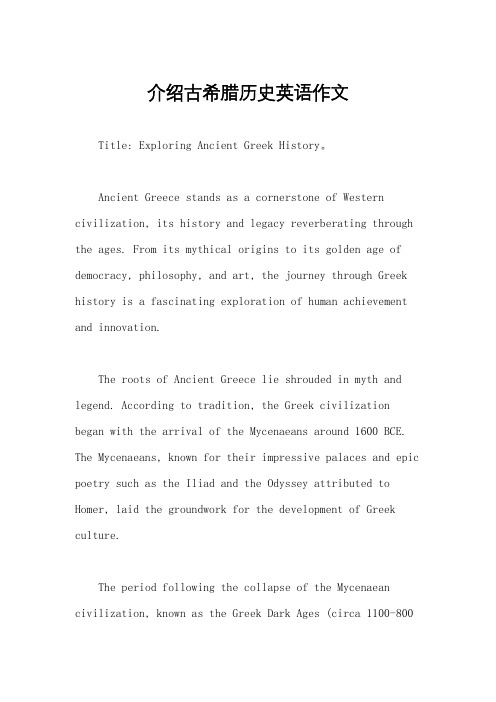
介绍古希腊历史英语作文Title: Exploring Ancient Greek History。
Ancient Greece stands as a cornerstone of Western civilization, its history and legacy reverberating through the ages. From its mythical origins to its golden age of democracy, philosophy, and art, the journey through Greek history is a fascinating exploration of human achievement and innovation.The roots of Ancient Greece lie shrouded in myth and legend. According to tradition, the Greek civilization began with the arrival of the Mycenaeans around 1600 BCE. The Mycenaeans, known for their impressive palaces and epic poetry such as the Iliad and the Odyssey attributed to Homer, laid the groundwork for the development of Greek culture.The period following the collapse of the Mycenaean civilization, known as the Greek Dark Ages (circa 1100-800BCE), was marked by a decline in population, literacy, and overall societal complexity. However, it also laid the foundation for the emergence of the Greek city-states, or polis, which would come to define the political landscape of ancient Greece.The Archaic Period (circa 800-500 BCE) witnessed the rise of city-states such as Athens and Sparta. Athens, with its democratic experiments under leaders like Solon and Cleisthenes, became a beacon of political innovation. Meanwhile, Sparta developed a militaristic society focused on discipline and prowess in battle.The pinnacle of Greek civilization is often associated with the Classical Period (circa 500-323 BCE). This era saw the flourishing of arts, philosophy, and literature. In Athens, the democratic system reached its zenith under the leadership of statesmen like Pericles, while intellectual giants like Socrates, Plato, and Aristotle laid the foundations of Western philosophy. The art of this period, epitomized by the sculptures of Phidias and the dramas of Aeschylus, Sophocles, and Euripides, still captivatesaudiences today.However, the glory of the Classical Period was not without its challenges. The Persian Wars (499-449 BCE) saw Greek city-states unite against the mighty Persian Empire, culminating in victories at Marathon, Thermopylae, and Salamis. These conflicts solidified Greek identity and inspired future generations with tales of valor and heroism.The aftermath of the Persian Wars ushered in a periodof conflict and upheaval known as the Peloponnesian War (431-404 BCE), pitting Athens and its allies against Sparta and its allies. The war, chronicled by Thucydides, highlighted the perils of unchecked ambition and thefragility of alliances. Despite its eventual defeat, Athens remained a cultural and intellectual powerhouse in the wake of the war.The Hellenistic Period (circa 323-31 BCE) witnessed the spread of Greek culture throughout the Mediterranean world following the conquests of Alexander the Great. Greek language, art, and philosophy became dominant across vastterritories, blending with local traditions to create arich tapestry of Hellenistic civilization.In conclusion, the history of Ancient Greece is a testament to the enduring legacy of human ingenuity and resilience. From its mythical beginnings to its lasting contributions to art, philosophy, and governance, the story of Ancient Greece continues to captivate and inspire generations across the globe.。
古希腊文明神话英语作文
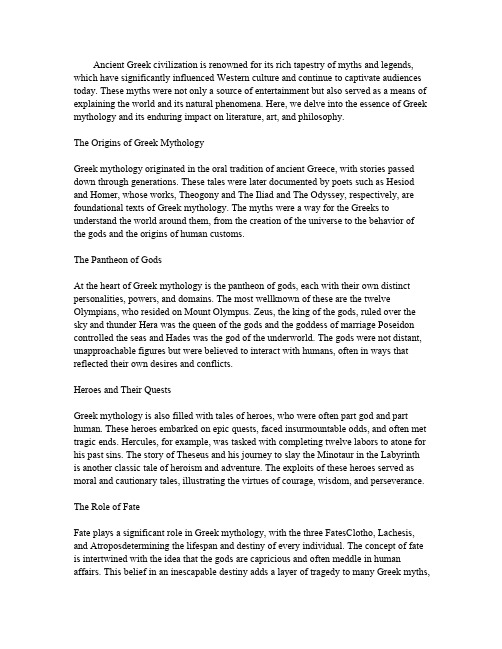
Ancient Greek civilization is renowned for its rich tapestry of myths and legends, which have significantly influenced Western culture and continue to captivate audiences today.These myths were not only a source of entertainment but also served as a means of explaining the world and its natural phenomena.Here,we delve into the essence of Greek mythology and its enduring impact on literature,art,and philosophy.The Origins of Greek MythologyGreek mythology originated in the oral tradition of ancient Greece,with stories passed down through generations.These tales were later documented by poets such as Hesiod and Homer,whose works,Theogony and The Iliad and The Odyssey,respectively,are foundational texts of Greek mythology.The myths were a way for the Greeks to understand the world around them,from the creation of the universe to the behavior of the gods and the origins of human customs.The Pantheon of GodsAt the heart of Greek mythology is the pantheon of gods,each with their own distinct personalities,powers,and domains.The most wellknown of these are the twelve Olympians,who resided on Mount Olympus.Zeus,the king of the gods,ruled over the sky and thunder Hera was the queen of the gods and the goddess of marriage Poseidon controlled the seas and Hades was the god of the underworld.The gods were not distant, unapproachable figures but were believed to interact with humans,often in ways that reflected their own desires and conflicts.Heroes and Their QuestsGreek mythology is also filled with tales of heroes,who were often part god and part human.These heroes embarked on epic quests,faced insurmountable odds,and often met tragic ends.Hercules,for example,was tasked with completing twelve labors to atone for his past sins.The story of Theseus and his journey to slay the Minotaur in the Labyrinth is another classic tale of heroism and adventure.The exploits of these heroes served as moral and cautionary tales,illustrating the virtues of courage,wisdom,and perseverance.The Role of FateFate plays a significant role in Greek mythology,with the three FatesClotho,Lachesis, and Atroposdetermining the lifespan and destiny of every individual.The concept of fate is intertwined with the idea that the gods are capricious and often meddle in human affairs.This belief in an inescapable destiny adds a layer of tragedy to many Greek myths,as characters are often caught in a web of events beyond their control.The Influence of Greek MythologyThe stories of Greek mythology have had a profound impact on Western literature,art, and philosophy.They have inspired countless works of art,from the sculptures of Phidias to the paintings of Botticelli.In literature,the themes and characters of Greek myths have been reinterpreted in works such as James Joyces Ulysses and T.S.Eliots The Waste Land.Philosophers have also drawn upon Greek myths to explore concepts of morality, free will,and the nature of the divine.Modern InterpretationsToday,Greek mythology continues to inspire new interpretations in various forms of media,including film,television,and literature.The stories have been adapted and reimagined in ways that reflect contemporary concerns and sensibilities.For example,the Percy Jackson series by Rick Riordan recasts Greek gods and heroes in a modern context, appealing to a new generation of readers.In conclusion,Greek mythology is more than just a collection of ancient stories it is a cultural legacy that continues to shape our understanding of the world and our place in it. The myths of ancient Greece offer timeless lessons about the human condition,the nature of power,and the complexities of morality,making them as relevant today as they were in the time of the ancient Greeks.。
关于希腊作文(英文)
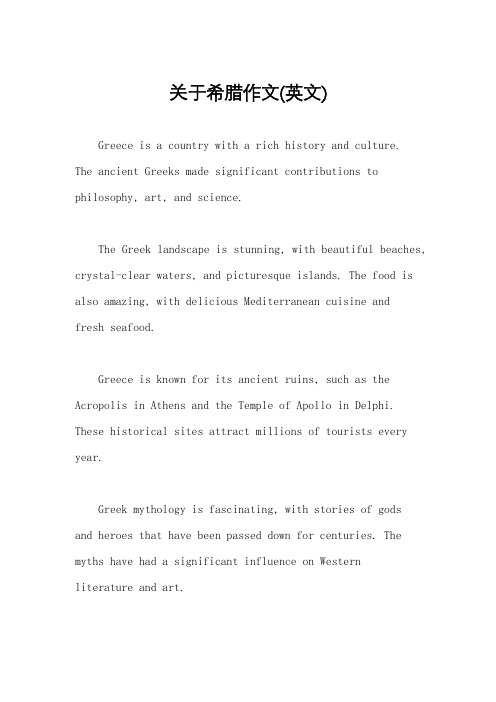
关于希腊作文(英文)Greece is a country with a rich history and culture.The ancient Greeks made significant contributions to philosophy, art, and science.The Greek landscape is stunning, with beautiful beaches, crystal-clear waters, and picturesque islands. The food is also amazing, with delicious Mediterranean cuisine andfresh seafood.Greece is known for its ancient ruins, such as the Acropolis in Athens and the Temple of Apollo in Delphi. These historical sites attract millions of tourists every year.Greek mythology is fascinating, with stories of godsand heroes that have been passed down for centuries. The myths have had a significant influence on Westernliterature and art.The Greek people are known for their warmth and hospitality. They are proud of their heritage and traditions, and they love to share them with visitors.The Greek economy has faced challenges in recent years, but the country is working hard to recover. Tourism and agriculture are important industries for Greece.The Greek language is unique and beautiful, with its own alphabet and rich literary tradition. Learning Greek can open up a whole new world of literature and culture.Overall, Greece is a country with a lot to offer. Its history, natural beauty, and vibrant culture make it atruly special place.。
希腊文化 英文作文
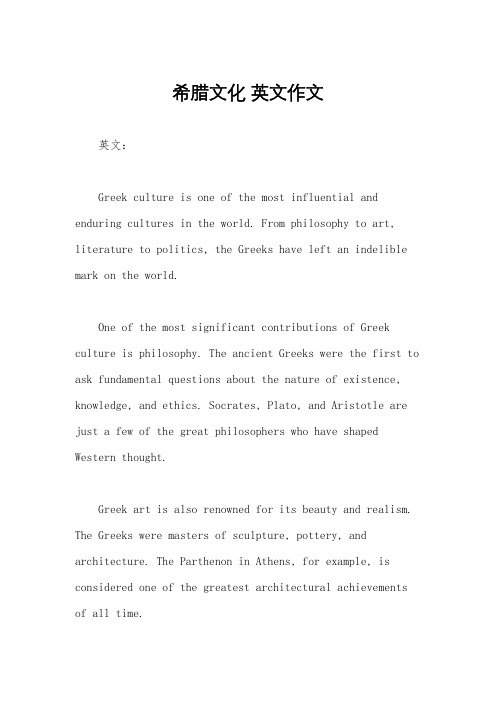
希腊文化英文作文英文:Greek culture is one of the most influential and enduring cultures in the world. From philosophy to art, literature to politics, the Greeks have left an indelible mark on the world.One of the most significant contributions of Greek culture is philosophy. The ancient Greeks were the first to ask fundamental questions about the nature of existence, knowledge, and ethics. Socrates, Plato, and Aristotle are just a few of the great philosophers who have shaped Western thought.Greek art is also renowned for its beauty and realism. The Greeks were masters of sculpture, pottery, and architecture. The Parthenon in Athens, for example, is considered one of the greatest architectural achievements of all time.Greek literature has also had a profound impact on the world. The epic poems of Homer, such as the Iliad and the Odyssey, are still widely read and studied today. Greek drama, particularly the works of Aeschylus, Sophocles, and Euripides, has also influenced Western literature and theater.In addition to these cultural achievements, the Greeks also made significant contributions to politics and science. The concept of democracy, for example, originated inancient Greece. Greek scientists, such as Pythagoras and Archimedes, made groundbreaking discoveries in mathematics and physics.Overall, Greek culture has had a lasting impact on the world, shaping the way we think about philosophy, art, literature, politics, and science.中文:希腊文化是世界上最有影响力和持久的文化之一。
希腊文明的特点英语作文

希腊文明的特点英语作文The Defining Features of Greek CivilizationThe ancient Greek civilization is renowned for its lasting impact on the cultural, intellectual, and political landscape of the Western world. From the iconic Parthenon in Athens to the philosophical works of Plato and Aristotle, the influence of Greek civilization can be seen in various aspects of modern society. This essay will explore the defining features that made the Greek civilization so remarkable and enduring.One of the most prominent characteristics of Greek civilization was its emphasis on the pursuit of knowledge and intellectual discourse. The Greeks were deeply curious about the world around them and sought to understand the nature of the universe, the human condition, and the principles of governance. This thirst for knowledge led to the development of various fields of study, including philosophy, mathematics, astronomy, and the natural sciences. Thinkers such as Socrates, Plato, and Aristotle engaged in rigorous debates and discussions, laying the foundations for Western philosophy and laying the groundwork for the scientific method.Another defining feature of Greek civilization was its vibrant and diverse cultural landscape. The Greeks placed a high value on the arts, with architecture, sculpture, painting, and theater all flourishing during this period. The construction of grand temples, such as the Parthenon in Athens, showcased the Greeks' mastery of engineering and their appreciation for aesthetic beauty. The Greek theater, with its tragedies and comedies, served as a platform for exploring the human experience and grappling with complex social and ethical issues.The political systems of ancient Greece were also highly influential and innovative. The development of democracy in Athens, with its emphasis on citizen participation and the rule of law, was a groundbreaking concept that would later inspire democratic movements around the world. The Greeks also experimented with other forms of government, such as oligarchy and monarchy, and engaged in sophisticated debates about the merits and drawbacks of each system.In addition to their intellectual and cultural achievements, the Greeks were also renowned for their military prowess. The Greek city-states, such as Sparta and Athens, were fiercely competitive and often engaged in warfare with one another. However, the Greeks also developed innovative military strategies and technologies that would influence the course of Western military history. The hoplite infantry,with its distinctive phalanx formation, was a formidable force on the battlefield, and the Greeks' use of naval power, exemplified by the Battle of Salamis, played a crucial role in their victories against the Persian Empire.Furthermore, the Greeks made significant contributions to the development of science and mathematics. The work of mathematicians like Euclid and Archimedes laid the foundations for modern geometry and physics, while the Greeks' observations of the natural world, including the movements of the planets and the structure of the human body, paved the way for future scientific discoveries.The legacy of Greek civilization can be seen in the enduring influence of its language, literature, and cultural traditions. The Greek alphabet, which formed the basis for the Latin alphabet used in many Western languages, is a testament to the Greeks' linguistic and literary achievements. The epic poems of Homer, the tragedies of Sophocles and Euripides, and the philosophical dialogues of Plato continue to be studied and celebrated today, providing insight into the human experience and the pursuit of wisdom.In conclusion, the ancient Greek civilization was a remarkable and multifaceted civilization that has left an indelible mark on the world. Its emphasis on intellectual discourse, cultural vibrancy, politicalinnovation, military prowess, and scientific advancement have all contributed to its enduring legacy and influence. The defining features of Greek civilization continue to inspire and shape the course of human civilization, making it a truly remarkable and enduring legacy.。
有关希腊文明的英语作文

有关希腊文明的英语作文Title: The Magnificent Legacy of Ancient Greek Civilization。
Introduction:Ancient Greece, renowned for its rich culture, intellectual achievements, and lasting contributions to human civilization, stands as a beacon of enlightenment and innovation. From its inception around the 8th century BCEto its culmination in the Hellenistic period, Greek civilization left an indelible mark on history, shaping the arts, philosophy, politics, and sciences. This essay explores the multifaceted aspects of ancient Greek civilization, elucidating its enduring legacy thatcontinues to resonate in the modern world.I. Historical Context:Ancient Greece emerged from a collection of city-states,each with its own government, culture, and traditions. The period from the 5th to 4th century BCE is often referred to as the "Golden Age" of Greece, marked by unprecedented advancements in various domains.II. Art and Architecture:Greek art and architecture exemplify unparalleled beauty and sophistication. The Doric, Ionic, and Corinthian architectural styles pioneered by the Greeks continue to inspire architects worldwide. Iconic structures like the Parthenon, a symbol of classical architecture, showcase the Greeks' mastery of proportion, symmetry, and aesthetic harmony. Sculptures such as the Venus de Milo and the Discus Thrower epitomize the idealized human form, reflecting Greek ideals of physical perfection and divine beauty.III. Philosophy and Intellectual Thought:The intellectual ferment of ancient Greece gave birth to philosophy, a pursuit of wisdom and understanding of theuniverse and human existence. Preeminent philosophers like Socrates, Plato, and Aristotle laid the groundwork for Western philosophical tradition. Socrates' dialectical method of inquiry, Plato's theory of forms, and Aristotle's systematic approach to knowledge profoundly influenced subsequent philosophical discourse. Their ideas on ethics, politics, metaphysics, and epistemology remain relevant and continue to shape contemporary thought.IV. Democracy and Politics:Ancient Greece pioneered the concept of democracy,where citizens participated in decision-making processesand had a voice in governance. Athenian democracy, albeit limited to male citizens, represented a significant departure from autocratic rule prevalent in other civilizations. The democratic ideals espoused by ancient Greece laid the groundwork for modern systems of governance, emphasizing individual rights, rule of law, and civic engagement.V. Literature and Drama:Greek literature and drama flourished during antiquity, producing timeless works that continue to captivate audiences worldwide. Epic poems like the Iliad and the Odyssey, attributed to Homer, narrate heroic exploits and moral dilemmas that resonate across cultures and ages. Greek tragedies, exemplified by the works of playwrights like Aeschylus, Sophocles, and Euripides, explore profound themes of fate, hubris, and the human condition. The enduring legacy of Greek literature lies in its ability to evoke empathy, provoke introspection, and inspire artistic expression.VI. Scientific and Mathematical Achievements:The intellectual curiosity of ancient Greeks extended to the realm of science and mathematics. Pioneering figures such as Pythagoras, Euclid, and Archimedes made groundbreaking discoveries that laid the foundation for modern scientific inquiry. Pythagoras' theorem revolutionized geometry, Euclid's Elements became the cornerstone of mathematical rigor, and Archimedes'principles of buoyancy and leverages advanced engineering and physics. The legacy of Greek scientific inquiry underscores the importance of empirical observation, deductive reasoning, and critical thinking in advancing human knowledge.Conclusion:The legacy of ancient Greek civilization endures as a testament to the boundless potential of human intellect and creativity. From its artistic splendor and philosophical insights to its democratic ideals and scientific achievements, ancient Greece continues to inspire and inform contemporary society. By understanding and appreciating the multifaceted contributions of ancient Greece, we gain insight into our shared human heritage and the enduring quest for knowledge, beauty, and truth.。
介绍希腊历史英文作文

介绍希腊历史英文作文英文,As a history enthusiast, I am fascinated by the rich and complex history of Greece. From the ancient civilization of the Minoans to the classical era of Athens and Sparta, Greece has left an indelible mark on Western civilization.The history of Greece can be traced back to the Bronze Age, with the rise of the Minoan civilization on the island of Crete. The Minoans were known for their advanced architecture, art, and trade, and their influence can be seen in later Greek culture.However, it is the classical era of Greece that is perhaps the most well-known and celebrated. This was a time of great achievements in philosophy, literature, and art, with the likes of Socrates, Plato, and Aristotle shaping Western thought and culture for centuries to come. Thecity-states of Athens and Sparta also played a crucial role in this era, with their military prowess and politicalsystems influencing later civilizations.Of course, no discussion of Greece would be complete without mentioning its mythology, which has captured the imaginations of people around the world. From the epic tales of the Trojan War to the adventures of Odysseus, Greek mythology has become a cornerstone of Western literature and culture.中文,作为一个历史爱好者,我对希腊的丰富而复杂的历史深感着迷。
双语介绍古希腊文明(一)

the Ancient Greek Civilization ( I )古希腊(Greece)是西方文明的源头之一,古希腊文明持续了约650年(公元前800 年-公元前146年),是西方文明最重要和直接的渊源。
Ancient Greece is one of the sources of Western civilization. Ancient Greek civilization lasted about 650 years (800-146 BC), which is the most important and direct source of Western civilization.西方有记载的文学、科技、艺术都是从古代希腊开始的。
The recorded literature, technology and art in the West all started from ancient Greece.古希腊不是一个国家的概念,而是一个地区的称谓。
古希腊位于欧洲的东南部、地中海的东北部,包括希腊半岛、爱琴海和爱奥尼亚海上的群岛和岛屿、土耳其西南沿岸、意大利东部和西西里岛东部沿岸地区。
古希腊是指古代巴尔干半岛南部、爱琴海诸岛和小亚细亚沿岸的总称。
Ancient Greece does not only refer to the country, but the whole region,which was located in the southeast of Europe and the northeast of Mediterranean Sea, including Greek peninsula, archipelagos and islands in Aegean Sea and Ionian Sea, the southwest coast of Turkey, the east coast of Italy and the east coast of Sicily. Ancient Greece refers to the southern Balkans, Aegean islands and the coast of Asia Minor. The Aegean culture from 3000 BC to 2000 BC is the forerunner of its history.peninsula 英[p ninsj l ] 美[p nins l ]noun 半岛an area of land that is almost surrounded by water but is joined to a larger piece of landthe Iberian peninsula (= Spain and Portugal) 伊比利亚半岛archipelago [qki'pel g ] unoun【不规则形式】pl. -os or -oes群岛;列岛;群岛周围的海a group of islands and the sea surrounding themBalkans['bo:lk nz]noun [pl.]巴尔干(位于欧洲东南部,包括萨瓦河和多瑙河以南诸国)a region of SE Europe,including the countries to the south of the rivers Sava and Danube【派生词】Balkan adj. the Balkan Peninsula巴尔干半岛公元前5〜6世纪,特别是希波战争以后,古希腊地区的经济生活高度繁荣、科技高度发达,产生了光辉灿烂的希腊文化,对后世产生深远影响。
有关希腊文化的英语作文

有关希腊文化的英语作文Greek culture has been a significant and enduring influence on the development of Western civilization. From its ancient roots in the Hellenic world to its ongoing impact on contemporary society, the rich tapestry of Greek culture has left an indelible mark on art, philosophy, architecture, and countless other aspects of human endeavor. This essay will explore some of the key elements that have made Greek culture so remarkable and enduring.One of the most striking aspects of Greek culture is its profound and lasting impact on the field of philosophy. The ancient Greek thinkers were pioneers in the realm of rational inquiry, laying the foundation for the systematic exploration of the nature of reality, knowledge, and the human condition. Figures such as Socrates, Plato, and Aristotle developed sophisticated philosophical frameworks that continue to shape our understanding of the world and our place in it. Their works delved into fundamental questions about the nature of justice, the good life, the structure of the universe, and the limits of human knowledge, laying the groundwork for the Western philosophical tradition.Beyond philosophy, the ancient Greeks made monumental contributions to the realms of art and architecture. The stunning temples, sculptures, and paintings of classical Greece continue to captivate and inspire people around the world. The Parthenon, for instance, stands as a timeless testament to the Greeks' mastery of proportion, symmetry, and the human form. The graceful columns, intricate friezes, and harmonious composition of this iconic structure reflect the Greek reverence for balance, harmony, and the pursuit of aesthetic perfection. Similarly, the statues of gods, heroes, and mortals created by Greek sculptors such as Phidias and Praxiteles embody a profound understanding of the human body and a commitment to capturing its essence in breathtaking detail.The influence of Greek culture can also be seen in the realm of literature and drama. The epic poems of Homer, the tragedies of Sophocles and Euripides, and the comedies of Aristophanes continue to be studied and performed worldwide, testament to the enduring power of their storytelling and the profound insights they offer into the human condition. These works grapple with themes of fate, justice, the role of the gods, and the struggles of individuals within the larger social and political fabric, providing timeless reflections on the human experience.Moreover, the legacy of Greek culture can be seen in the veryfoundations of modern democracy. The ancient Athenian system of government, with its emphasis on citizen participation, checks and balances, and the rule of law, laid the groundwork for the democratic ideals that have since spread across the globe. The concepts of voting, legislative bodies, and the separation of powers all have their roots in the political institutions of ancient Greece, which continue to inspire and guide the democratic movements of the present day.In the realm of science and mathematics, the Greeks were also groundbreakers, making significant advances in fields such as astronomy, geometry, and medicine. Thinkers like Pythagoras, Euclid, and Hippocrates developed theories and methods that laid the foundation for our modern understanding of these disciplines. The Greeks' emphasis on empirical observation, logical reasoning, and the systematic exploration of the natural world helped pave the way for the scientific revolution that would come centuries later.The influence of Greek culture can even be seen in the very language we use today. Many of the words and concepts that are fundamental to Western languages and intellectual traditions have their origins in ancient Greek. From the roots of our scientific terminology to the concepts that undergird our philosophical and political discourse, the Greek language has left an indelible mark on the way we communicate and understand the world around us.Despite the passage of millennia, the legacy of Greek culture continues to resonate in the modern world. The ideals of democracy, the pursuit of aesthetic and intellectual excellence, and the commitment to rational inquiry that defined the Hellenic world still shape and inspire people across the globe. Whether in the halls of academia, the stages of the performing arts, or the deliberations of legislative bodies, the influence of Greece can be seen and felt.Ultimately, the enduring significance of Greek culture lies in its ability to speak to the universal human experience. The ancient Greeks grappled with timeless questions about the nature of reality, the meaning of justice, and the pursuit of the good life – questions that still captivate and challenge us today. Through their art, their philosophy, and their political institutions, the Greeks have left us an invaluable legacy, one that continues to inform and enrich our understanding of the world and our place within it.。
希腊文化的影响英语作文
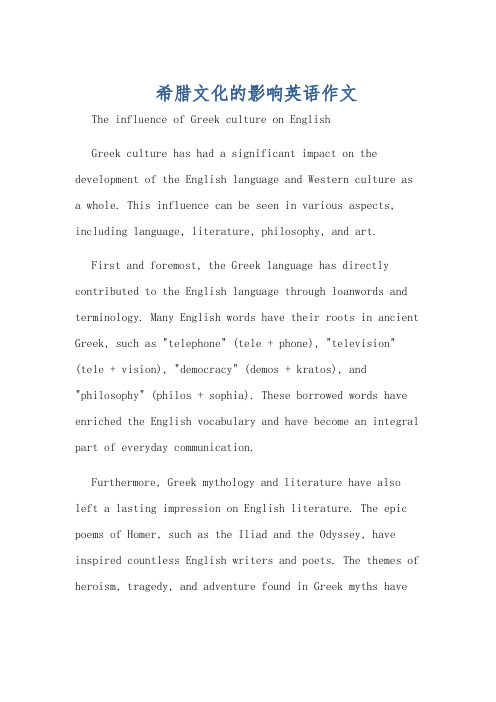
希腊文化的影响英语作文The influence of Greek culture on EnglishGreek culture has had a significant impact on the development of the English language and Western culture as a whole. This influence can be seen in various aspects, including language, literature, philosophy, and art.First and foremost, the Greek language has directly contributed to the English language through loanwords and terminology. Many English words have their roots in ancient Greek, such as "telephone" (tele + phone), "television" (tele + vision), "democracy" (demos + kratos), and "philosophy" (philos + sophia). These borrowed words have enriched the English vocabulary and have become an integral part of everyday communication.Furthermore, Greek mythology and literature have also left a lasting impression on English literature. The epic poems of Homer, such as the Iliad and the Odyssey, have inspired countless English writers and poets. The themes of heroism, tragedy, and adventure found in Greek myths havebeen reimagined and reinterpreted in English literature, from Shakespeare's plays to contemporary novels.In addition to language and literature, Greek philosophy has played a crucial role in shaping Western thought and intellectual traditions. The works of philosophers like Socrates, Plato, and Aristotle have deeply influenced English philosophers and thinkers, from the Renaissance to the Enlightenment. Their ideas about ethics, politics, and the nature of reality have become foundational concepts in Western philosophy and continue to be studied and debated in English-speaking academic circles.Moreover, Greek art and architecture have also had a profound impact on Western aesthetics and design. The classical art and sculptures of ancient Greece have served as a model for artistic expression in the Western world. The principles of symmetry, proportion, and harmony, as exemplified in Greek architecture, have been emulated in English buildings and city planning, from the Parthenon to the White House.In conclusion, Greek culture has left an indelible mark on the English language and Western civilization. Itsinfluence can be seen in the vocabulary we use, the stories we tell, the ideas we ponder, and the beauty we create. The enduring legacy of Greek culture continues to inspire and enrich our lives, serving as a timeless source of knowledge and creativity.希腊文化对英语的影响希腊文化对英语语言的发展和西方文化的形成产生了重要影响。
古希腊文学英语作文
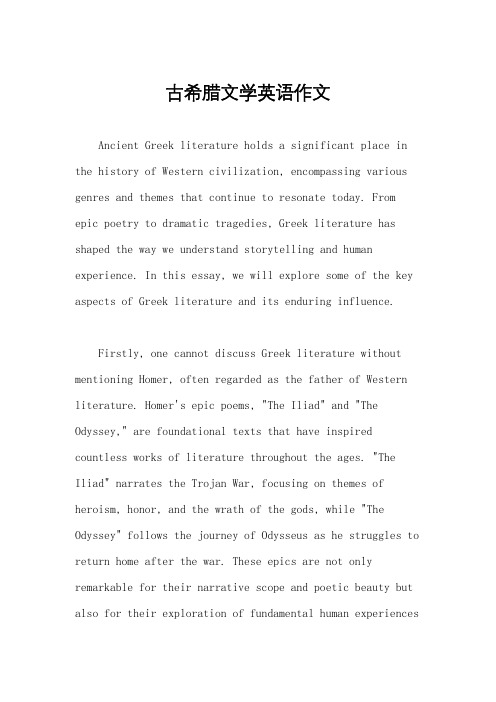
古希腊文学英语作文Ancient Greek literature holds a significant place in the history of Western civilization, encompassing various genres and themes that continue to resonate today. From epic poetry to dramatic tragedies, Greek literature has shaped the way we understand storytelling and human experience. In this essay, we will explore some of the key aspects of Greek literature and its enduring influence.Firstly, one cannot discuss Greek literature without mentioning Homer, often regarded as the father of Western literature. Homer's epic poems, "The Iliad" and "The Odyssey," are foundational texts that have inspired countless works of literature throughout the ages. "The Iliad" narrates the Trojan War, focusing on themes of heroism, honor, and the wrath of the gods, while "The Odyssey" follows the journey of Odysseus as he struggles to return home after the war. These epics are not only remarkable for their narrative scope and poetic beauty but also for their exploration of fundamental human experiencesand emotions.Another significant genre of Greek literature is tragedy, exemplified by the works of playwrights like Aeschylus, Sophocles, and Euripides. Greek tragedies often revolve around themes of fate, morality, and the human condition. One of the most famous examples is Sophocles' "Oedipus Rex," which tells the story of a king who unknowingly fulfills a prophecy that he will kill hisfather and marry his mother. Through the tragic downfall of its protagonist, the play explores the limits of human knowledge and the inevitability of fate.In addition to epic poetry and tragedy, Greekliterature also encompasses other genres such as comedy, history, and philosophy. The comedies of playwrights like Aristophanes provide a satirical commentary on contemporary society and politics, often using humor to critique social norms and institutions. Meanwhile, the works of historians like Herodotus and Thucydides offer valuable insights into ancient Greek society and its historical events, shaping the way we study and understand the past.Moreover, Greek philosophy, with luminaries such as Socrates, Plato, and Aristotle, has had a profound impact on Western thought and intellectual history. Plato's dialogues, for instance, explore fundamental questions about ethics, politics, and the nature of reality, laying the groundwork for centuries of philosophical inquiry. Aristotle's writings, spanning subjects from metaphysics to biology, have also been instrumental in shaping various fields of knowledge, influencing thinkers across diverse cultures and epochs.The enduring influence of Greek literature can be seen in its pervasive presence in contemporary culture. From the countless adaptations and reinterpretations of ancient myths in literature, art, and film to the enduring relevance of philosophical concepts like democracy and ethics, the legacy of Greek literature continues to shape our understanding of the world.In conclusion, Greek literature represents a rich and diverse tradition that has profoundly influenced the courseof Western civilization. From epic poetry to philosophy, its enduring legacy continues to inspire and captivate readers across the globe, reminding us of the timeless power of storytelling and the pursuit of knowledge.。
对希腊的见解英文作文

对希腊的见解英文作文英文:My View on Greece。
Greece holds a special place in my heart, both for its rich history and its breathtaking landscapes. When I think about Greece, the first thing that comes to mind is its ancient civilization, which has left an indelible mark on the world. From the majestic ruins of Athens to the serene beauty of the Greek islands, there is so much to explore and admire in this country.One aspect of Greece that I particularly appreciate is its cultural heritage. The Greeks have made significant contributions to art, philosophy, and literature, shaping Western civilization as we know it today. For example, the works of Plato and Aristotle continue to influence thinkers and scholars around the globe. Moreover, Greek mythology has captured the imagination of people for centuries, withits captivating tales of gods and heroes.Another aspect of Greece that fascinates me is its culinary tradition. Greek cuisine is renowned for its fresh ingredients and bold flavors. Whether it's indulging in a traditional moussaka or savoring a plate of fresh seafood by the Aegean Sea, the food in Greece never fails todelight the taste buds. One of my fondest memories issitting at a taverna in Athens, enjoying a meal withfriends while listening to live music—a quintessential Greek experience.Furthermore, Greece's natural beauty is simply unparalleled. The azure waters of the Mediterranean, framed by rugged cliffs and sandy beaches, are a sight to behold. Exploring the narrow streets of Santorini or hiking through the olive groves of Corfu is like stepping into a postcard. Each island has its own unique charm, offering endless opportunities for adventure and relaxation.In conclusion, Greece is a country that captivates and inspires me in so many ways. Whether it's the allure of itsancient history, the warmth of its people, or the stunning landscapes, there is always something new to discover and appreciate. I look forward to returning to Greece one day and creating more unforgettable memories.中文:对希腊的看法。
有深意的希腊文化英语作文

有深意的希腊文化英语作文Introduction:The ancient civilization of Greece has left an indelible mark on the modern world, particularly in the realms of art, philosophy, science, and politics. This essay will delve into the deep significance of Greek culture and its enduring influence on contemporary society.Body:1. Philosophical Legacy- The Greeks are credited with laying the foundation of Western philosophy. Thinkers like Socrates, Plato, and Aristotle introduced concepts such as logic, ethics, and metaphysics that continue to shape philosophical discourse today.2. Democratic Ideals- Athens, one of the city-states of ancient Greece, is widely recognized as the birthplace of democracy. The principles of citizen participation and the rule of law that were established in ancient Greece are cornerstones of modern democratic systems.3. Artistic and Architectural Achievements- Greek art and architecture have had a profound impact on aesthetics. The classical orders of architecture (Doric, Ionic, and Corinthian) are still studied and emulated inmodern design. The humanistic approach to sculpture, emphasizing naturalism and idealized beauty, has influenced countless artists.4. Scientific and Mathematical Contributions- Greek scholars made significant contributions to thefields of science and mathematics. Pythagoras, Euclid, and Archimedes, among others, developed theories and principles that are fundamental to modern physics and mathematics.5. Olympic Games and the Pursuit of Excellence- The Olympic Games, inspired by the ancient Olympicfestival held in Olympia, are a testament to the Greeks' celebration of physical prowess and the pursuit of excellence. The modern Olympic Games carry forward the spirit of sportsmanship and international unity.6. Mythology and Literature- Greek mythology has enriched literature, influencing countless works of poetry, drama, and fiction. The stories of gods, heroes, and epic quests have become a common cultural heritage shared by people around the world.Conclusion:The legacy of Greek culture is a rich tapestry woven into the fabric of modern society. From the philosophicalunderpinnings of our thought processes to the democratic principles that govern our nations, from the architectural grandeur that adorns our cities to the stories that entertain and educate, the influence of Greece is both profound and pervasive. As we continue to explore and learn from thisancient civilization, we gain a deeper appreciation for the interconnectedness of human history and the enduring wisdom of the past.。
英语介绍古希腊文化的作文
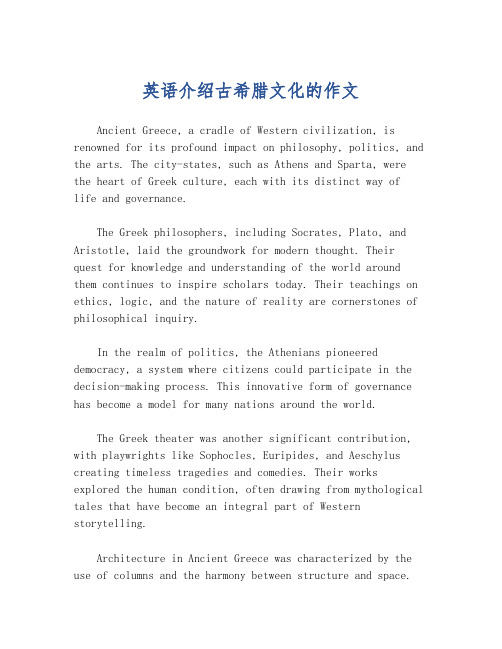
英语介绍古希腊文化的作文Ancient Greece, a cradle of Western civilization, is renowned for its profound impact on philosophy, politics, and the arts. The city-states, such as Athens and Sparta, were the heart of Greek culture, each with its distinct way oflife and governance.The Greek philosophers, including Socrates, Plato, and Aristotle, laid the groundwork for modern thought. Their quest for knowledge and understanding of the world around them continues to inspire scholars today. Their teachings on ethics, logic, and the nature of reality are cornerstones of philosophical inquiry.In the realm of politics, the Athenians pioneered democracy, a system where citizens could participate in the decision-making process. This innovative form of governance has become a model for many nations around the world.The Greek theater was another significant contribution, with playwrights like Sophocles, Euripides, and Aeschylus creating timeless tragedies and comedies. Their works explored the human condition, often drawing from mythological tales that have become an integral part of Western storytelling.Architecture in Ancient Greece was characterized by the use of columns and the harmony between structure and space.The Parthenon, standing on the Acropolis in Athens, is a prime example of this, with its elegant Doric columns and intricate friezes.The Olympic Games, which originated in Greece, were a celebration of athletic prowess and a symbol of peace. Athletes from across the region would gather to compete in various sports, fostering a spirit of camaraderie andfriendly rivalry.Greek mythology, with its pantheon of gods and goddesses, heroes and monsters, has captured the imagination of generations. These stories, filled with drama and moral lessons, have influenced literature, art, and even modern-day movies and television.The legacy of Ancient Greece is a testament to the enduring power of ideas and creativity. Its contributions to knowledge, governance, and culture continue to resonate, shaping the world we live in today.。
- 1、下载文档前请自行甄别文档内容的完整性,平台不提供额外的编辑、内容补充、找答案等附加服务。
- 2、"仅部分预览"的文档,不可在线预览部分如存在完整性等问题,可反馈申请退款(可完整预览的文档不适用该条件!)。
- 3、如文档侵犯您的权益,请联系客服反馈,我们会尽快为您处理(人工客服工作时间:9:00-18:30)。
The ancient Greek civilization(古希腊文明)
古希腊位于地中海东北部。
历史表明,克里特的征服者、特洛伊城的毁灭者——迈锡尼人,是希腊最早的居民之一。
但是古希腊文明的源头是爱琴文明,多年后爱琴人有了辉煌的米诺斯与迈锡尼文化。
随后便产生了璀璨的希腊文明。
Ancient Greece is located in the northeastern Mediterranean. History shows that, the conqueror of Crete, the destruction of Troy - the Mycenaeans, is the earliest inhabitants of greece. But,the source of the ancient Greek civilization is the Aegean civilization,many years later, Aegean has brilliant Minoan and Mycenaean culture.Then created bright Greek civilization.
古希腊文化作为古典文化代表,在西方乃至世界都占有极其重要地位,主要包括了古希腊战争,古希腊艺术和古希腊神话。
Ancient Greek culture as the representative of classical culture, in the western world has occupied a very important position, including the ancient Greek War, the ancient Greek art and ancient Greek mythology.
说真的,希腊卓有成就的文化领域与神话传说密切相关。
希腊神话传说不但是希腊人最早的文学,而且是希腊人最早的意识形态。
Actually,Greece successful cultural fields and myths and legends are closely related. Greek mythology is not only the earliest literature, and it is the earliest ideology.
希腊神话主要包括神的故事和英雄传说两部分。
In Greek mythology, including God and the story of two heroes of legend。
希腊的神话故事,内容非常丰富生动,它是人类在童年时代充满天真纯朴、活泼浪漫的想象的结果,表现了古希腊人渴望了解自然、征服自然的美好愿望和顽强意志。
例如,有许多像普罗米修斯这样造福人类的伟大的神。
普罗米修斯把天火盗到人间,使人类有了划时代的进步。
希腊神话给古希腊人带来了多神崇拜,也带来了具有积极因素的共同信仰。
神话传说不但作为原始文化遗产被希腊人继承,而且极大地影响了后来希腊文化的兴盛。
The Greek myths, the content is very rich and vivid, it is the humanity in the childhood is full of simple, lively and romantic imagination results, showing the ancient Greeks desire to understand nature, conquer nature aspiration and tenacity. For example,many like Plo Michel J, also has the benefit of mankind's great god. Plo Michel J put the fire theft to the world, so that human beings have the epoch-making progress。
Greek mythology to the ancient Greeks brought God worship. the unity of God worship also brought with the active factors in the common belief. Myth not only as the original cultural heritage by the Greeks inheritance, but also greatly influenced later Greek culture development.
英雄传说是对于远古的历史、社会生活和人向自然作斗争等事件的回忆。
英雄被当作神和人所生的后代,实际上是集体的力量和智慧的代表,体现了希腊人对的果敢精神。
The legend of heroes for the ancient history, social life and to struggle for natural events such as memory. Heroes are treated as the offspring of a God and man, is actually the collective strength and wisdom of the representatives, reflects the Greeks to the bold spirit.
然而希腊神话并不仅仅是希腊神话。
除了以上的文化价值,它还有更高的社会意义。
While the Greek mythology not only is a Greek myth. In addition to the above cultural values, it has more social significance.
近代,科学的发展也需要希腊文化的浇灌。
天文学的星座,高等数学的希腊符号等等,英文中大量借用希腊文来描绘科学现象,像仙女座一词的希腊文是安得洛玛达,意为仙女,是希腊神话中的国王的女儿。
Modern, scientific development also needs the Greek culture water. Astronomy constellation, higher mathematics Greek symbols and so on, English borrowed heavily from Greek to describe phenomena, like Andromeda is a Greek fairy Andeluomada, meaning in Greek mythology, is the daughter of the king of Uranus。
在政治法律上,也有借用希腊神话的典故,而这在文学作品中最为常见。
好多西方的成语源自于古希腊,如斯芬克斯之谜比喻难题;德摩克利斯之剑比喻十分危险,还有俄尔浦斯的琴,丘比特之箭等等。
In politics and law, also borrowed from Greek mythology references, and this is most common in literary works. Many Western idioms originated in ancient Greece, so green mystery analogy problem; the sword of Damocles metaphor is very dangerous, and Eerpusi violins, Cupid's arrow and so on 总之,希腊神话对欧美的影响甚为深远
In summary, Greek mythology to Europe and the United States has a profound influence.。
